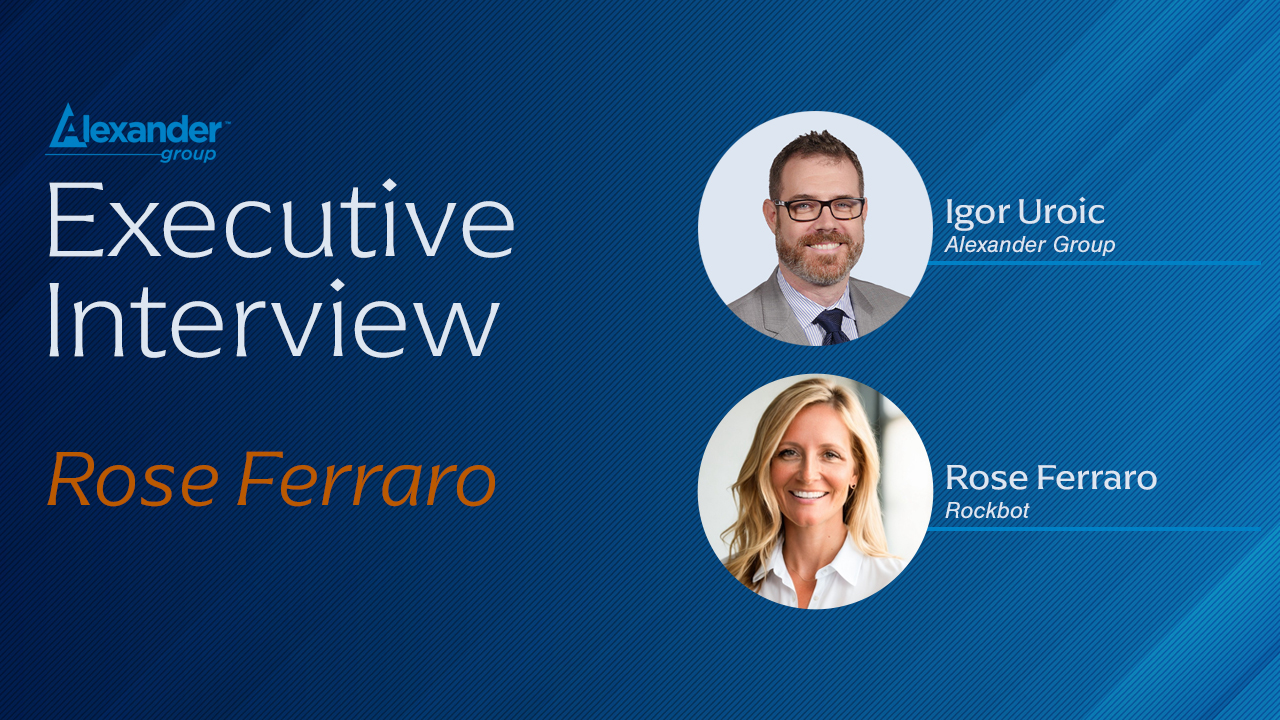Gary Tubridy: Hi. Gary Tubridy here, principal at the Alexander Group. We’re here at the Executive Forum. We have keynotes lined up and our first keynote here is “Technology Disruptors in the Future of Work.” Kate Parente, chief people officer at Pegasystems, is here to chat with us about that. Kate, great to have you here. Thanks for joining us so much.
Katherine Parente: Great to be here.
Gary Tubridy: Tell me a little bit about Pega and what attracted you to the company.
Katherine Parente: Great. Well, first of all, thank you for having me. Very excited for the keynote later. Pegasystems is a platform company that provides AI decision-making tools for large-scale organizations. I joined the company almost two years ago now. If I were to tell you, in short, what really drew me to a company like Pega? This is a very nerdy company, and I consider myself to be pretty nerdy. So when I started to hear more and more about the work that they do and their background, I became very intrigued very quickly. Probably the main things were things like culture. It’s a company that has a deep, rich history. The pride in the product. We have a bunch of customers who have been with our company for more than 30 years. The company itself is 40 years old with the same founder and CEO through that period.
Gary Tubridy: So a deeper history than many people would know.
Katherine Parente: Exactly. And I think that’s pretty special and pretty unique. One of the things that I learned early on is tha for those 40 years, we have a mission, a vision that’s largely been unchanged. And I’ve never worked for a company like that before.
Gary Tubridy: So, the topic you’re diving into is disruptors in the future of work. Tell me a little bit about the disruptors. The big disruptors in today’s world.
Katherine Parente: Well, I’m starting to feel like we are in the era of disruption. Three years ago, I think we were all sent home and told to stay there. We then lived through was it the great resignation? Followed by the great regret, followed by the great reshuffle. Then it was the great Re, re Re and re. I feel you know that was a big disruption and we kind of learned a lot about each other and about how we work. We’re still in that disruption. Now it’s kind of shifted towards how do we make something work that is hybrid, that brings people together, but yet still honors sort of some of the goodness of what we learned about working remotely and working across boundaries over the last three years. I would be remiss not to mention sort of the other big disruptor at the moment generative AI. And I think this one is huge because there’s really no one who can tell us what the outcome will be.
Gary Tubridy: Nobody’s been there before.
Katherine Parente: Exactly, exactly.
Gary Tubridy: So we have to think out of the box and think forward. Tell me a little bit about how you see these disruptors, AI in particular, changing the way people work and any examples you might project to, even if they’re not wholly formed yet?
Katherine Parente: Absolutely. We are already seeing the impact of AI on how we work, how we learn, I think, is a really interesting way of thinking about AI. I think we are going to see changes across the full spectrum of learning that goes even beyond the workforce. One of the areas in which we talk about learning at Pega is called Socratic learning. And I don’t know if you’ve heard of that, but I think a lot of people are talking about it and there’s some buzz. We at Pega have become pretty obsessed already with taking Socratic learning methodology and building it into our product. For anyone who hasn’t heard of Socratic learning, it’s all about sort of having AI ingest content, information, data from, potentially various sources. Then having sort of the capability of interacting with a human through providing information and asking questions to really gauge a person’s retention of that information. If you think about it, the limitless possibilities of being able to do anything. Learn anything and then apply that learning almost immediately. It’s pretty. Fascinating.
Gary Tubridy: Yeah, yeah. So, in recent conversations with me have a great relationship with your CEO, and I’m wondering, as you think about disruptors, as it affects Pega, how does your work with the CEO help you approach these disruptors in-house at Pega?
Katherine Parente: Great question. So I didn’t mention this earlier, but the relationship that I have with our CEO and founder, Alan Trefler, is another thing that drew me to Pega when I was exploring the company. As I said, Alan has been the CEO and founder of Pega for more than 40 years now. We had our anniversary this year. I might describe him as the nerd of Pega. We have a partnership where we talk pretty much daily, or we touch base daily. And in terms of sort of disruptors in that part of the conversation, I think Alan is somebody who has probably always dreamed of this moment. I watched something recently. It was a podcast on generative AI, and I heard a comment about Pega talking about AI 10 years ago. And now this is that moment. Some of the things that Alan and I talk about and that we are both really passionate about are being transparent with our organization. And I think as generative AI sort of takes shape and takes form, more and more we see a little bit of resistance to that. We see people reacting to it and being nervous about it.
Gary Tubridy: There’s a lot of nervousness.
Katherine Parente: Absolutely. And I think it’s human and natural but some of the techniques and styles that Alan and I talk about are related to keeping people in the know. Right? Taking people along the ride, making sure that people see the excitement. As opposed to what’s going to change about my job and how am I going to avoid that change?
Gary Tubridy: So engaging them in the journey, we’re in this together. Let’s go along and make this work. What can companies do then to help their colleagues get more engaged in this? Don’t be afraid. This is happening. And let’s make this a good ride. What can they do to help them?
Katherine Parente: Yeah. I think companies really need to step up right now to give people that confidence. I think, even more importantly, leaders have an opportunity to showcase what it means to live in ambiguity. To be uncomfortable with not knowing. I think that’s unnatural, but something crucial to be a good leader. Communication is part of that. I think we need to role model some of this. Maybe find ways to disrupt our own work.
Gary Tubridy: I’ve heard that term from learning to being comfortable in uncomfortable times. And I kind of like it because there’s so much change coming at us. That those who can be comfortable in uncomfortable times kind of have a bit of an advantage, don’t they? Tell me about the importance of learning in times of constant and disruptive change. A learning organization can help their people along, can’t it?
Katherine Parente: Absolutely. I mean, I talked a little bit about Socratic learning, but I guess more fundamentally, we’ve always stressed the idea of information and knowledge and education being tied to enablement. If you think about today’s sort of disruption from AI, I actually think that the ability to unlearn is almost as important as it is.
Gary Tubridy: Some things have to be forgotten.
Katherine Parente: Exactly. Or just like the courage to say what I’ve been doing and what I’ve thought was always the only way or the best way may not be that anymore.
Gary Tubridy: Any examples, Kate, at this juncture of programs, learning opportunities that you’re instituting or have seen instituted to help bring people along to learn what they need to or unlearn what they should to take advantage of AI and other disruptors?
Katherine Parente: So we have a pretty strong and unique form of enablement for our front-line teams. So sales, marketing, services. And I would say we’re getting ready to flip that on its side to really inject some of this Socratic learning into our own learning. And we started to do that already internally. We’re getting excited about embedding some of that technology in our product. I guess what would be unique for our company and for Pega is expanding that to folks across the organization who maybe aren’t in a frontline job. I think as people start to sort of experience more information more readily, we all become spokespeople for our company, spokespeople for our product. And having that enablement be something that’s kind of like across the company.
Gary Tubridy: As we talk about building matrix teams, this is actually an opportunity to take that on and make the company perhaps operate more smoothly. More efficiently.
Katherine Parente: Absolutely. I mean, what was it I said this earlier, we at the flip of a switch, we’re able to completely go from what was almost 100% in-person, face-to-face interactions to overnight being 100% remote. And I think we’re trying to take the best of that forward. And there are so many things that we can do to make things better for our clients, improve our level of service.
Gary Tubridy: So AI can actually improve the rate of learning and perhaps the scope of learning all at the same time.
Katherine Parente: Yeah. So exciting.
Gary Tubridy: Yeah. Are there disruptors and associated changes in the way people work? An opportunity here to bring marketing, sales and service together. We talk about the revenue function as Marketing, Sales and Service. So they’re kind of customer-facing or customer-touching. They’ve been separate departments or functions. And they’re all kind of coming together because they have to serve the interests of the customer. And the customer kind of expects this to happen. I wonder if the use of some of these AI technologies and turning these organizations on their side. Is this an opportunity to create a true revenue function that provides better service to the customer?
Katherine Parente: I think in a previous life, getting information, in particular getting information about a specific client or a specific problem or a specific incident, required multiple conversations. It wasn’t that you just had this virtual buddy.
Gary Tubridy: And no guarantee of success.
Katherine Parente: Exactly. Usually there wasn’t any. Usually it was a trial and error. And when you think about the possibility of AI and having sort of your buddy be one single point of contact with information that is readily available, not only is there an opportunity for the sort of full scale, end-to-end spectrum of people who touch our client to work more closely together, there are opportunities for our clients to experience improved service. Right? So with our people no longer needing to travel, you’ve cut back on costs for clients with access to information at the ready. When a problem comes up and we’re going to troubleshoot it, we’ve already got a catalog of numerous potential solutions. I think that’s one of the things that excites me the most that makes me think we haven’t even begun to think about how cool this is going to be.
Gary Tubridy: Last question, Kate. There are people at this conference that know AI is important, and they’re wrestling with the notion of, where do I start? How do I get into it in 2024? So do you have any advice for folks that they want to start getting into it? How do they take this on? Where do they start?
Katherine Parente: Well, I would say first and foremost, prepare for resistance. I think approaching AI and getting sort of educated and getting started is a lot about just getting your own head in the space. You talked a little bit about being comfortable in the uncomfortable. But really just wrapping your mind around there is no answer. None of us have the answer. Things are going to change so dramatically we can’t even dream of it. Pega has an advantage in terms of AI because we’ve been working with AI for more than 10 years, but I would say in other areas, other potential industries, other technology organizations, the opportunity is there if you open your mind to it. I think there’s a lot going on, like this conference and many other forums, where people are talking about things they’re already trying and testing, and so there’s just this massive opportunity for us to learn from each other.
Gary Tubridy: Be prepared for resistance, but don’t let it stop you. Get moving.
Katherine Parente: Exactly.
Gary Tubridy: Kate, thanks very much for joining us at the forum this year. Appreciate it very much.
Katherine Parente: Thank you.




